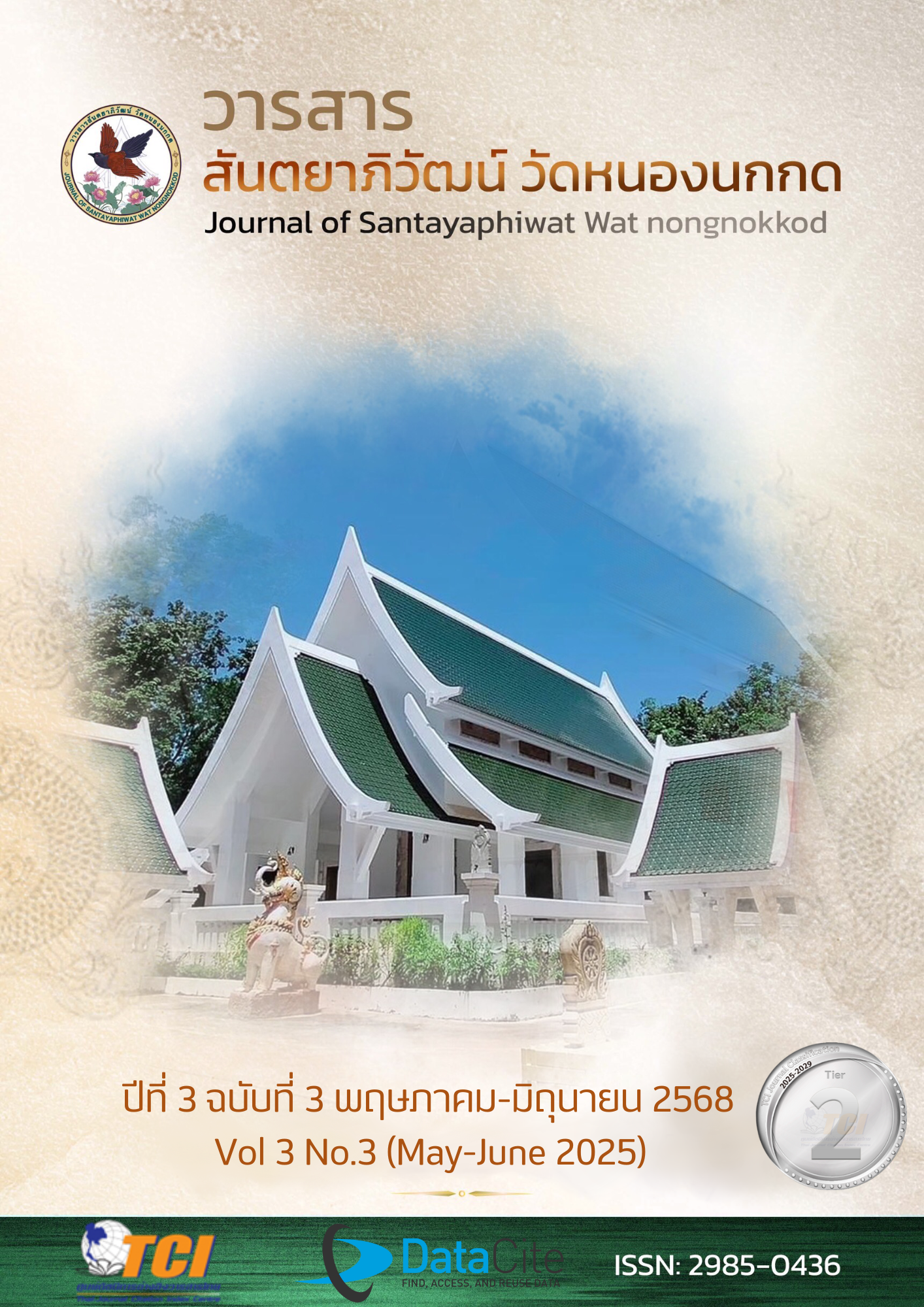IMPROVING THE QUALITY OF LIFE OF TEACHERS AT WICHUTIT SCHOOL ACCORDING TO BUDDHIST ETHICS
Keywords:
Quality of Life, Teacher, Buddhist EthicsAbstract
This research aimed to 1) study the development of quality of life
2) study the Buddhist ethics, and 3) analyze the development of quality of life of teachers at Wichutit School according to Buddhist ethics. This research studied by conducting qualitative research, focusing on documentary research, surveying data from primary documents, Tripitaka, books related to Buddhist ethics, books on the development of quality of life of teachers according to Buddhist ethics and interviewed with key informants.
The research results found that:
1) Development of quality of life according to Buddhist ethics can be concluded that Buddhist ethics in Theravada Buddhism is a principle that emphasizes human behavior to create happiness, peace and tranquility in society. This principle was called “ethics” or Wmorality" that was practiced in an orderly manner. It was divided into 3 main steps: 1. Basic Buddhist ethics, 2. Intermediate Buddhist ethics 3. Advanced Buddhist ethics.
2) The Buddhist ethics in developing quality of life of teachers at Wichutit School can be concluded as follows: Buddhist ethics are based on the principles of truth and morality. Truth was the part that was naturally true that shown through the principles of the three characteristics and dependent origination etc..
3) Analysis of the development of the quality of life of teachers at Wichutit School. It can be concluded that the life of teachers began with the observance of the precepts, which means following the moral precepts that are an important foundation in life, especially in terms of physical, verbal and mental behavior.
References
ฐานวุฑโฒภิกขุฐ. (2533). มงคลชีวิตฉบับธรรมทายาท, (หนังสืออนุสรณ์งานฌาปนกิจคุณแม่อาเตียง แช่จิว, กรุงเทพฯ: กราฟฟิคอาร์ต, 7.
ณปภัช พัชรกรโชติ. (2564). พุทธจริยธรรม : แนวคิดและนโยบายการพัฒนาการเมืองการปกครองท้องถิ่นไทย. ใน รายงานสืบเนื่องจากการประชุมวิชาการระดับชาติครั้งที่ 7, 730.
พระครูวินัยธรอำนาจ พลปญฺโญ และคณะ. (2560). พุทธจริยศาสตร์กับการพัฒนาการศึกษาเรื่องความจริงความรู้ความดี. วารสารสันติศึกษาปริทรรศน์ มจร 5(1), 335.
พระธรรมปิฎก (ป.อ. ปยุตฺโต). (2540). พระพุทธศาสนาพัฒนาคนและสังคม. กรุงเทพฯ:กรมการปกครอง.
พระครูกิตติโชติคุณ กิตฺติปาโล (ปะละกัง). (2562). พุทธจริยศาสตร์กับการป้องกันและแก้ไขปัญหายาเสพติดของชุมชน ในอำเภอเปือยน้อย จังหวัดขอนแก่น. ใน ดุษฎีนิพนธ์พุทธศาสตรดุษฎีบัณฑิต. มหาวิทยาลัยจุฬาลงกรวิทยาลัย.
พระพรหมคุณาภรณ์ (ป.อ. ปยุตโต). (2550). การพัฒนาที่ยั่งยืน. (พิมพ์ครั้งที่ 5). กรุงเทพฯ: บริษัท สหธรรมิก จำกัด.
มหาวิทยาลัยมหาจุฬาลงกรณราชวิทยาลัย. (2536). ความหมายของจริยศาสตร์. มังคลัตถทีปนี ภาค 2 ฉบับบาลี, 47.
สำเนียง ยอดคีรี. (2560). จริยศาสตร์ จริยธรรม และคุณธรรมตามแนวคิดของนักปรัชญา. วารสารปรัชญาปริทรรศน์, 22(2), 39-40.
สุเมธ เมธาวิทยกูล. (2534). ปรัชญาเบื้องต้น. กรุงเทพฯ: สำนักพิมพ์โอเดียนสโตร์ฯ.









